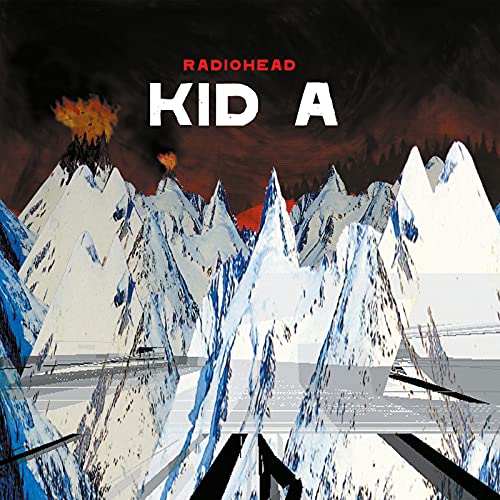Radiohead
Kid A 2000
"After Pink Floyd made "Dark Side of the Moon", they became gradually more cynical and bloated, before eventually imploding under the weight of Roger Waters' ego. What a blessing, therefore, that Radiohead didn't go the same way after the revered "OK Computer". Instead they went back to basics, shrugged off history and the expectations placed on them, and began to approach music-making from a completely new angle. The first of the two albums resulting from these sessions was "Kid A", which had the far superior material.
"Everything In Its Right Place" was a firm slap in the face to make it clear to everyone that they were back, and going to damn well write songs the way they liked. No guitars. A stately techno refrain, a mangled burbling of backing vocals, and Thom Yorke's insistent sneering about sucking a lemon. The title track takes us even further away from floppy-haired indie rock, with some Aphex-like ambient techno and a vocal line distorted into oblivion. "National Anthem" is a daring composition, with an ever-present bass riff which is gradually swamped underneath a chaotic jumble of jazz horns.
Their familiar symphonic rock melancholy is back under a shimmering new guise - "How To Disappear Completely". As Yorke laments "I'm not here, this isn't happening" and strums his guitar, the orchestral backing is contorted and spliced just enough to cross the line from sentimentality to other-worldliness. The following instrumental "Treefingers" is reminiscent of Brian Eno's ambient productions, and didn't sound out of place when played on BBC Radio 3's late night eclectic music show.
The second half begins straightforwardly with "Optimistic", a reminder of the harder-edged indie rock of The Bends. "In Limbo" may have come from OK Computer, with its distinctively Radiohead chiming guitar and organ. However the next two tracks are Radiohead in firmly contemporary mode. The itchy, restless electronica of "Idioteque" is followed by a more restrained, but spooky "Morning Bell". In both of these, Thom's voice and melody soars effortlessly over the scratchy background.
"Motion Picture Soundtrack" ends the album theatrically with another idea seemingly pulled out of nowhere. A glittering curtain of harps surrounds the sampled show chorus and grinding organ. Another reviewer pointed out the similarity with the end of Beatles' White Album - certainly not too lofty a comparison. After all this may become the reference standard years from now."
